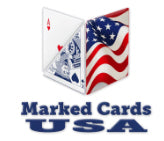Poker is not just a card game — it's a cultural phenomenon, a thinking sport, and a worldwide hobby. Played in kitchens at home, to high-roller tournament rooms in Las Vegas, poker has entertained millions with its ideal mix of luck, skill, psychology, and strategy. But where did it start?
At Marked Cards USA, we deal in serious player tools — from high-end marked decks to poker accessories — but even we take a step back and enjoy the rich history that created this legendary game. Let's explore the interesting beginnings of poker.
Early Influences: Games That Paved the Way
Although modern poker started in America, its origins can be found in a number of old European, Middle Eastern, and Asian games. Historians tend to cite the following as precursors:
As Nas (Persia): A 16th-century Persian playing card game played with a 25-card deck and five suits. People wagered on the quality of their hand, similar to poker.
Poque (France and England): This game of 17th-century France was one of bluffing and betting, and closely resembled today's poker in structure and strategy.
Primero (Spain and Italy): From the 1500s, this game of three cards per player involved bluffing — another poker staple of today.
As European colonists exported their games to the New World, the ingredients of modern poker started blending and creating.
Poker in Early America
The earliest certain reference to "poker" in American history is from the early 1800s on the Mississippi River. Riverboat gamblers would often play a variation of the game with a 20-card deck and four players. Four cards were dealt to each, and bets were made on which player had the best hand. It was a fairly straightforward form of the game, but it set the stage for what poker would evolve into.
As the game became popular across the nation, the use of the standard 52-card deck was adopted, with more combinations of hands, flushes, and ultimately more intricate betting systems. By the time of the American Civil War, poker had developed into a number of different forms, such as Stud Poker and Draw Poker.
The Rise of Modern Poker
By the early 20th century, poker was a well-established game in saloons and private clubs throughout the United States. The 1970s witnessed the emergence of professional poker with the introduction of the World Series of Poker (WSOP) in Las Vegas. Televised poker and the advent of Texas Hold'em brought the game into the mainstream.
The early 2000s' online poker boom — particularly after amateur player Chris Moneymaker's 2003 win of the WSOP Main Event — burst the game's popularity globally. Now, poker is played in virtually every country, and the Internet has brought it within easier reach than ever before.
Poker, Marked Cards, and the Edge of Innovation
As poker developed, the player's tools and methods followed suit. One such development is the employment of marked cards — a once-cheating practice that is now commonly employed for training, performance magic, and strategic analysis.
At Marked Cards USA, we offer expertly marked decks that assist magicians in mastering their tricks or poker players in honing their advantage in regulated, ethical settings. Whether infrared ink, glow marks, or barcode decks, we introduce contemporary card technology to an ageless game.

